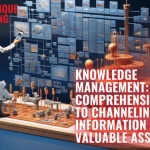In the dynamic and rapidly evolving landscape of modern businesses, robust knowledge management systems (KMS) and well-informed employees are paramount. Knowledge is a critical asset that empowers organisations to stay competitive, agile, and innovative.
Implementing effective KMS ensures that valuable information is organised, accessible, and continually updated, fostering a culture of continuous learning and improvement. Employees equipped with up-to-date knowledge can streamline processes, make informed decisions, and enhance overall productivity.
A centralised knowledge platform serves as a reservoir of expertise, enabling teams to provide timely advice and support to clients and colleagues alike. In essence, investing in knowledge management not only catalyses efficiency within an organisation but also establishes a foundation for sustained growth and excellence in service delivery.
Upon completion of this course, participants will be able to:
- Promote and champion the effective exchange of knowledge.
- Cultivate a supportive atmosphere within your organisation that fosters the sharing of knowledge.
- Instil a culture that prioritises collaborative information sharing.
- Encourage and inspire employees to contribute positively as team members.
- Nurture a culture that emphasises the importance of sharing
- Establish and reinforce a 'learning organisation' mindset.
- Positively incentivise employees to engage as effective team players.
- Conduct a comprehensive assessment of knowledge management within your organisation.
- Implement practical tools and techniques for sharing knowledge.
- Formulate a strategic knowledge management plan to institutionalise practices within your organisation.
This course is designed for anyone responsible for maintaining a valuable knowledge base within an organisation to ensure future development and continuous improvement. It would be most beneficial for:
- Business Owners
- Knowledge Managers
- Partnerships Managers
- Directors
- Chief Executives
- HR Management
- Operations Managers
- Project Managers
- Change & Development Managers
This course uses a variety of adult learning styles to aid full understanding and comprehension. Participants will work together to understand the various methods of knowledge base management and how these elements are updated.
They will review presentations to share ideas on the best knowledge base systems and uncover new technologies to help display the most up-to-date and relevant data to inform their businesses. They will then complete a group project to decide how implementing a new knowledge base would work and discuss how this could affect the wider organisation.
Day 5 of each course is reserved for a Q&A session, which may occur off-site. For 10-day courses, this also applies to day 10
Section 1: Why Continued Knowledge Development is Essential
- Embracing lifelong learning for business advancement.
- Strategies for continuous skill enhancement in the workplace.
- Adapting to dynamic industry trends through ongoing education.
- Utilising digital resources for sustained business knowledge.
- Crafting personalised learning plans for corporate growth.
- Networking and collaborative learning in business knowledge development.
- Ensuring competitiveness: Navigating changing business landscapes.
- Effective time management for ongoing corporate learning.
- Work-study balance: Practical tips for professionals in business.
- Online courses and webinars for business professional development.
- Cultivating a growth mindset: Meeting challenges in business learning.
Section 2: Context & New Techniques to Improve Knowledge
- Contextual understanding of industry trends.
- Integrating artificial intelligence in business processes.
- Digital transformation for enhanced knowledge flow.
- Cybersecurity awareness in the business context.
- Advanced project management techniques.
- Cross-functional collaboration for optimal knowledge transfer.
- Ethical considerations in knowledge management.
- Harnessing the power of predictive analytics.
- Innovations in continuous learning for workforce development.
Section 3: Feedback Loop Learning
- Data analytics for informed decision-making.
- Implementing continuous improvement models.
- Utilising performance metrics for feedback.
- Adaptive learning strategies.
- Feedback loop integration in training programs.
- Real-time feedback technologies.
- Developing constructive feedback cultures.
- Data-driven feedback analysis.
- Effective feedback communication skills.
- Feedback loop in project management.
- Agile feedback processes.
- Personalised learning through feedback.
- Feedback-driven innovation in business.
Section 4: Documentation to Show Knowledge
- Creating knowledge repositories.
- Compliance documentation in business.
- Documenting best practices.
- Information architecture for documentation.
- Documenting decision-making processes.
- Document version control.
- Collaborative documentation tools.
- Writing for different audiences.
- Documenting learning and development.
Section 5: Knowledge Management Tools & Practices
- Emerging technologies in business intelligence.
- Social media for knowledge sharing.
- Enterprise search technologies.
- Knowledge management metrics and analytics.
- Building communities of practice.
- Gamification in knowledge management.
- Cloud-based knowledge storage.
- Knowledge transfer strategies.
- AI and machine learning in knowledge management.
Section 6: Developing Your Knowledge Management Strategy
- Knowledge management strategies.
- Effective communication strategies in the digital age.
- Implementing agile methodologies for knowledge enhancement.
Upon successful completion of this training course, delegates will be awarded a Holistique Training Certificate of Completion. For those who attend and complete the online training course, a Holistique Training e-Certificate will be provided.
Holistique Training Certificates are accredited by the British Assessment Council (BAC) and The CPD Certification Service (CPD), and are certified under ISO 9001, ISO 21001, and ISO 29993 standards.
CPD credits for this course are granted by our Certificates and will be reflected on the Holistique Training Certificate of Completion. In accordance with the standards of The CPD Certification Service, one CPD credit is awarded per hour of course attendance. A maximum of 50 CPD credits can be claimed for any single course we currently offer.
- Course Code PO4-120
- Course Format Classroom, Online,
- Duration 5 days










